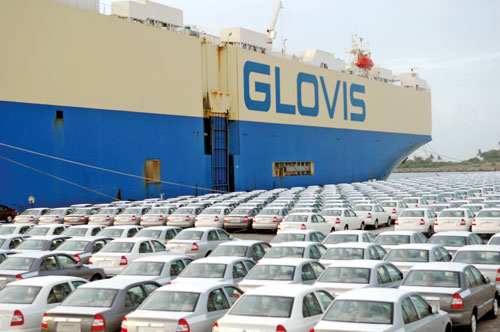More concessions for public official vehicle permits
View(s):
File picture of cars at the Hambantota port.
Sri Lanka’s senior state sector executive officials have been given more concessions with effect from June 1 under the duty slashed vehicle permit scheme.
The Finance Ministry has made several amendments to a trade and investment policy circular providing guidelines and offering more concessions on the import of vehicles for senior executives in management and administration at state institutions and state corporations.
According to these amendments made in accordance with the decisions reached during the cabinet meeting held on May 2, the registration of a vehicle that is obtained as per amendment must be registered under the permit holder’s name at the first instance.
The ownership of a vehicle worth US$25,000 or less can be transferred to a third party at any instance. The tax concessions granted to such vehicles has been increased to 65 per cent from 50 per cent.
A vehicle which is valued at more than $25,000 but less than $30,000 cannot be transferred to a third party before being used for five years, except under the criteria mentioned in the circular.
Tax reduction for such vehicles has also been increased to 60 per cent from 50 per cent.
Vehicle permits that were granted from November 20, 2015 until May 31, 2017 and vehicles that had been received clearance from the Customs on or before May 31, 2017 cannot be transferred to a third party before being used for five years except under the criteria mentioned in the circular.
 According to Finance Ministry statistics, the number of duty slashed permits issued for officials was around 38,000 under the previous concessionary scheme since 2010 and the tax waived in this regard exceeds Rs. 143 billion. But it has now come down to about 5,000 permits.
According to Finance Ministry statistics, the number of duty slashed permits issued for officials was around 38,000 under the previous concessionary scheme since 2010 and the tax waived in this regard exceeds Rs. 143 billion. But it has now come down to about 5,000 permits.
The privilege to purchase an imported or locally manufactured vehicle on a concessionary rate given for public officers, executive officers in state corporations and statutory boards, doctors and legal officers in government service, vice chancellors, university lecturers and executive non-academic staffers of the universities had been withdrawn in the 2016 Budget and a circular issued to this effect.
However it has been reintroduced by the Ministry of Finance in July 2016, with amendments following strong lobbying by different trade union groups under a trade and investment policy circular and this was amended recently providing more concessions.


